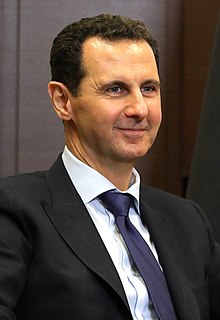
Back Basjar al-Assad Afrikaans Baschar al-Assad ALS በሽር አል አሳድ Amharic Bashar al-Assad AMI Baixar al-Assad AN بشار الأسد Arabic ܒܫܐܪ ܐܠܐܣܕ ARC بشار الاسد ARZ Bashar al-Ásad AST Bəşər Əsəd Azerbaijani
| ||
|---|---|---|
Media gallery |
||
 |
|---|
|
|
| Part of a series on |
| Ba'athism |
|---|
 |
Bashar al-Assad[a][b] (born 11 September 1965) is a Syrian politician who is the current and 19th president of Syria since 17 July 2000. In addition, he is the commander-in-chief of the Syrian Armed Forces and the secretary-general of the Central Command of the Arab Socialist Ba'ath Party, which nominally espouses a neo-Ba'athist ideology. His father and predecessor was General Hafiz al-Assad, whose presidency in 1971–2000 marked the transfiguration of Syria from a republican state into a de facto dynastic dictatorship, tightly controlled by an Alawite-dominated elite composed of the armed forces and the Mukhabarat (secret services), who are loyal to the al-Assad family.
Born and raised in Damascus, Bashar graduated from the medical school of Damascus University in 1988 and began to work as a doctor in the Syrian Army. Four years later, he attended postgraduate studies at the Western Eye Hospital in London, specialising in ophthalmology. In 1994, after his elder brother Bassel died in a car accident, Bashar was recalled to Syria to take over Bassel's role as heir apparent. He entered the military academy, taking charge of the Syrian occupation of Lebanon in 1998. On 17 July 2000, Bashar al-Assad became president, succeeding his father Hafiz, who had died on 10 June 2000. A series of crackdowns in 2001–02 ended the Damascus Spring, a period of cultural and political activism marked by calls for transparency and democracy. Although Bashar inherited the power structures and personality cult nurtured by Hafiz al-Assad, he lacked the loyalty received by his father, which led to rising discontent against his rule. As result, many members of the Old Guard resigned or were purged; and the inner-circle were replaced by staunch loyalists from Alawite clans. Bashar al-Assad's early economic liberalisation programs worsened inequalities and centralized the socio-political power of the loyalist Damascene elite of the Assad family; alienating the Syrian rural population, urban working classes, businessmen, industrialists and people from once-traditional Ba'ath strongholds. The Cedar Revolution in Lebanon in February 2005, triggered by the assassination of Lebanese Prime Minister Rafic Hariri, forced Bashar al-Assad to end Syrian occupation of Lebanon.
Assad's regime is a highly personalist dictatorship,[c] which governs Syria as a totalitarian police state.[d] Bashar al-Assad's reign has been characterised by numerous human rights violations and severe repression. While the Assad government describes itself as secular, various political scientists and observers note that his regime exploits sectarian tensions in the country. The first decade in power was marked by intense censorship, summary executions, forced disappearances, discrimination of ethnic minorities and extensive surveillance by the Ba'athist secret police. The United States, the European Union, and majority of the Arab League called for Assad's resignation from the presidency in 2011 after he ordered a violent crackdown on Arab Spring protesters during the events of the Syrian revolution, which led to the Syrian civil war. The civil war has killed around 580,000 people, of which a minimum of 306,000 deaths are non-combatant, with pro-Assad forces causing more than 90% of the civilian deaths.[7] The war has also forcibly displaced 14 million Syrians, with over 7 million refugees, causing the largest refugee crisis in the world. An additional 154,000 civilians have been forcibly disappeared or subject to arbitrary detentions; with over 135,000 individuals being tortured, imprisoned, or dead in government detention centres as of 2023.[e]
The Assad regime's perpetration of numerous war crimes and crimes against humanity during the civil war has led to international condemnation and isolation.[f] The Syrian military is estimated to have conducted over 300 chemical attacks, with UN investigations confirming at least nine chemical attacks conducted by pro-Assad forces.[13] The deadliest incident was a chemical attack in Ghouta on 21 August 2013, which caused the deaths of 1,100–1,500 civilians. In December 2013, the UN High Commissioner for Human Rights Navi Pillay stated that findings from an inquiry by the UN implicated Assad in war crimes. Investigations by the OPCW-UN Joint Investigative Mechanism and OPCW-UN IIT concluded that the Assad government was responsible for the 2017 Khan Shaykhun sarin attack and 2018 Douma chemical attack respectively.[g] In June 2014, the American Syrian Accountability Project included Assad on a list of war crimes indictments of government officials and sent it to the International Criminal Court. In 2023, Canada and the Netherlands filed a joint lawsuit at the International Court of Justice accusing the Assad government of infringing UN Convention Against Torture.[h] On 15 November 2023, France issued an arrest warrant against Assad over the use of banned chemical weapons against civilians in Syria.[14] Assad has categorically denied the allegations of these charges and has accused foreign countries, especially the American-led intervention in Syria, of purportedly attempting regime change.[15][16]
Cite error: There are <ref group=lower-alpha> tags or {{efn}} templates on this page, but the references will not show without a {{reflist|group=lower-alpha}} template or {{notelist}} template (see the help page).
- ^ Svolik, Milan. "The Politics of Authoritarian Rule". Cambridge University Press. Retrieved 21 October 2019.
- ^ Weeks, Jessica (2014). Dictators at War and Peace. Cornell University Press. p. 18.
- ^ Wedeen, Lisa (2018). Authoritarian Apprehensions. Chicago Studies in Practices of Meaning. University of Chicago Press.
- ^ Hinnebusch, Raymond (2012). "Syria: from 'authoritarian upgrading' to revolution?". International Affairs. 88 (1): 95–113. doi:10.1111/j.1468-2346.2012.01059.x.
- ^ Michalik, Susanne (2015). "Measuring Authoritarian Regimes with Multiparty Elections". In Michalik, Susanne (ed.). Multiparty Elections in Authoritarian Regimes: Explaining their Introduction and Effects. Studien zur Neuen Politischen Ökonomie. Springer Fachmedien Wiesbaden. pp. 33–45. doi:10.1007/978-3-658-09511-6_3. ISBN 978-3658095116.
- ^ Geddes, Barbara; Wright, Joseph; Frantz, Erica (2018). How Dictatorships Work. Cambridge University Press. p. 233. doi:10.1017/9781316336182. ISBN 978-1-316-33618-2. S2CID 226899229.
- ^ * "Assad, Iran, Russia committed 91% of civilian killings in Syria". Middle East Monitor. 20 June 2022. Archived from the original on 4 January 2023.
- "Civilian Death Toll". SNHR. September 2022. Archived from the original on 5 March 2022.
- "91 percent of civilian deaths caused by Syrian regime and Russian forces: rights group". The New Arab. 19 June 2022. Archived from the original on 5 January 2023.
- "2020 Country Reports on Human Rights Practices: Syria". U.S Department of State. Archived from the original on 2 July 2022.
- Roth, Kenneth (9 January 2017). "Barack Obama's Shaky Legacy on Human Rights". Human Rights Watch. Archived from the original on 2 February 2021.*
- "The Regional War in Syria: Summary of Caabu event with Christopher Phillips". Council for Arab-British Understanding.
- ^ Robertson QC, Geoffrey (2013). "11: Justice in Demand". Crimes Against Humanity: The Struggle for Global Justice (4th ed.). New York: The New Press. pp. 560–562, 573, 595–607. ISBN 978-1-59558-860-9.
- ^ Syria Freedom Support Act; Holocaust Insurance Accountability Act of 2011. Washington DC: Committee on Foreign Affairs, House of Representatives. 2012. pp. 221–229.
- ^ Vohra, Anchal (16 October 2020). "Assad's Horrible War Crimes Are Finally Coming to Light Under Oath". Foreign Policy. Archived from the original on 2 November 2020.
- ^ "German court finds Assad regime official guilty of crimes against humanity". Daily Sabah. 13 January 2022. Archived from the original on 22 January 2022.
- ^ Martina Nosakhare, Whitney (15 March 2022). "Some Hope in the Struggle for Justice in Syria: European Courts Offer Survivors a Path Toward Accountability". Human Rights Watch. Archived from the original on 5 April 2022.
- ^ * "Security Council Deems Syria's Chemical Weapon's Declaration Incomplete". United Nations: Meetings Coverage and Press Releases. 6 March 2023. Archived from the original on 14 March 2023.
- "Fifth Review Conference of the Chemical Weapons Convention". European Union External Action. 15 May 2023. Archived from the original on 15 May 2023.
- ^ "France issues arrest warrant for Syria's President Assad - source". Reuters. 15 November 2023.
- ^ King, Esther (2 November 2016). "Assad denies responsibility for Syrian war". Politico. Retrieved 21 December 2016.
The Syrian president maintained he was fighting to preserve his country and criticized the West for intervening. "Good government or bad, it's not your mission" to change it, he said.
- ^ writer(s) (6 October 2016). "'Bombing hospitals is a war crime,' Syria's Assad says". ITV News. Retrieved 21 December 2016.
The intense bombardment of Aleppo during an army offensive that began two weeks ago has included several strikes on hospitals, residents and medical workers there have said. But Assad denied any knowledge of such attacks, saying that there were only "allegations".
© MMXXIII Rich X Search. We shall prevail. All rights reserved. Rich X Search



